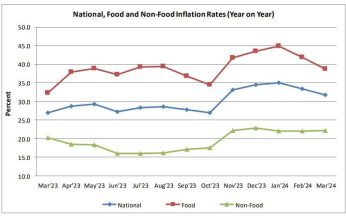2016: when kwacha Movement was volatile
The behaviour of the kwacha in 2016 was unpredictable as it was volatile against major trading currencies for a longer period.
To compound the problem, sales of tobacco—the country’s main foreign exchange earner—did not help matters either as the country’s green gold was bought at give away prices.
Tobacco is Malawi’s main export crop, contributing about 60 percent of forex earnings and 13 percent to the gross domestic product (GDP), the economy’s broadest measure.

Last year’s tobacco marketing season was characterised by high rejection rates and supply glut leading to poor prices.
At the close of the year, some tobacco farmers were yet to sell their tobacco, a development that will likely affect the forthcoming sales season.
Just before the tobacco market opened, the kwacha strengthened to around K530 to a dollar, a thing that did not please tobacco farmers.
Despite assurances by Minister of Finance, Economic Planning and Development Goodall Gondwe that the local unit would stabilize things never went according to plan.
The continued depreciation of the kwacha forced economists and consumer rights activists to predict doom for the country’s economy.
“It is inevitable that the kwacha fall is going to affect Malawians because we are not producing enough and the tobacco market has not done well,” said Ben Kaluwa, economics professor at University of Malawi’s Chancellor College.
While economists were searching for answers on the behaviour of the kwacha, the Reserve Bank of Malawi (RBM) announced the introduction of a K2 000 note which economists further argued was a true testament that the economy is under heavy stress.
Consumers Association of Malawi (Cama) executive director John Kapito argued that the introduction of the K2 000 note will further put pressure on the kwacha.
But Reserve Bank of Malawi (RBM) Governor Charles Chuka while agreeing that the kwacha could be under pressure with the introduction of the K2 000 note, said Malawians will not need to carry a lot of money when doing transactions.
He said: “The monetary policy requires that the highest note in circulation should be a store of value which is the case with the K2 000 note.”
But everything is not lost for Malawi, according to Gondwe, who said the economy will rebound this year owing to expected good rains.
Echoing Gondwe’s sentiments was CDH Investment Bank (CDHIB) chief executive officer Misheck Esau, who said they are optimistic that the economy will rebound.
“We know the economy is tough but things will not be like this forever. It is better to plan ahead,” he said.
The African Development Bank (AfDB) also agreed with Gondwe and Esau’s assessment. n





